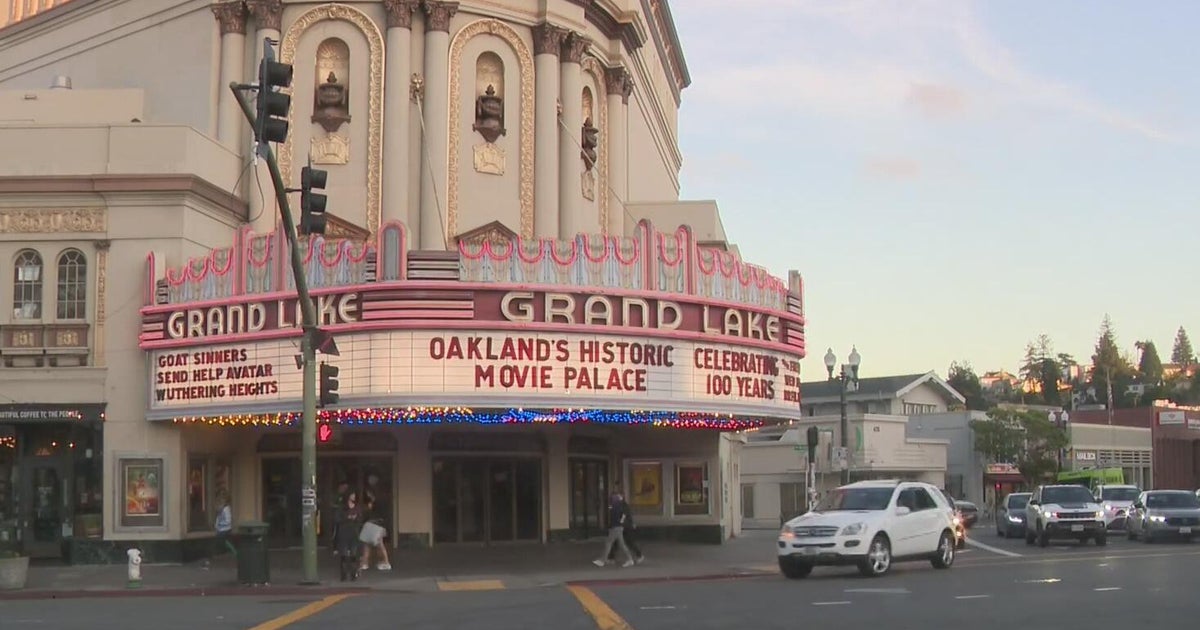Transcript: Jerome Adams on "Face the Nation," March 8, 2020
The following is a transcript of an interview with Surgeon General Jerome Adams that aired Sunday, March 8, 2020, on "Face the Nation."
MARGARET BRENNAN: Joining us now is the surgeon general Dr. Jerome Adams. He is part of the administration's coronavirus task force and the Trump administration's representative on our broadcast today. Dr. Adams, good morning to you.
U.S. SURGEON GENERAL DOCTOR JEROME ADAMS: Good morning.
MARGARET BRENNAN: I want to ask you about this cruise ship, Princess Cruises. The operator of that ship and the state of California have now announced some of the plans for the passengers. They're going to dock in Oakland tomorrow on a non-commercial port. The president said on Friday that people- he- he would rather people not be let off the ship. The vice president said they would, state of California says they would. Can you clarify what is happening to the thousands of people onboard?
DR. ADAMS: Well, we'll quickly get into the cruise ships. But what I want the American people to know is that the novel coronavirus is a family- comes from a family of viruses, including the cold, including SARS and MERS, which we've successfully navigated in the past, and that most people who get the coronavirus are going to have a mild disease. Very few will actually need to be hospitalized.
MARGARET BRENNAN: So- so for those people who are actually infected in this hot spot on this cruise ship, are they be- being released into the public?
DR. ADAMS: Well, what we're- what we're prioritizing when we look at the cruise ship situation is number one, making sure people who are sick on the cruise ship get the medical care that they need, that they're appropriately evacuated. And we've sent CDC teams on to the ship. We've sent personal protective equipment on to the ship. We're making sure number two, that we can get people off the ship as quickly and as safely as possible. But we're working with Department of Defense, Coast Guard and the local authorities to make sure we have a safe place to take these people to because we--
MARGARET BRENNAN: So does--
DR. ADAMS: --don't want to endanger--
MARGARET BRENNAN: Does that mean--
DR. ADAMS: --the local community.
MARGARET BRENNAN: --that people who are infected are going to go to military bases all around the country?
DR. ADAMS: Well, the plans are still being developed. But I want people to know that we are not going to put infected people into communities. Infected people will be quarantined- will be isolated appropriately so that we can make sure we're not putting communities at risk.
MARGARET BRENNAN: Okay because the governor of Georgia said 34 Georgians and additional Americans will be going to an airbase. You're saying none of those people will be infected?
DR. ADAMS: Well, there's a difference between quarantine and isolation. Isolation is where you put people who actually have tested positive. Quarantine is where you put people who've been exposed. We may be quarantining people in different places across the country while we watch them for 14 days to make sure they don't develop symptoms. But no one who's tested positive for a coronavirus or who has symptoms will be put in a position where they can expose other people.
MARGARET BRENNAN: OK. We're going to take a break and talk more on the other side of it. So stay with us, doctor.
DR. ADAMS: Thank you.
MARGARET BRENNAN: Stay with us here on FACE THE NATION.
(COMMERCIAL BREAK)
MARGARET BRENNAN: Welcome back to FACE THE NATION. We want to pick up where we left off with the surgeon general Dr. Jerome Adams. And I just want to just button up where we left off--
DR. ADAMS: Yes.
MARGARET BRENNAN: --on the matter of the cruise ship. If someone is exposed and testing positive, will they be kept in the state of California?
DR. ADAMS: Some of them- well we're still working out where we can best put those folks. You have to understand, these are four--
MARGARET BRENNAN: But they dock tomorrow.
DR. ADAMS: These are four- yes and that plan is being developed right now. There are four- almost 4,000 people on that cruise ship. We're working with the Department of Defense. The most important thing for American people to know is that folks who test positive will be kept isolated so that they cannot expose other people.
MARGARET BRENNAN: OK.
DR. ADAMS: We don't want to put communities at risk.
MARGARET BRENNAN: But people who do test positive could be dispersed to military bases around the country?
DR. ADAMS: Well, we're going to try to keep them as contained as possible, but we're going to make sure- and as close as possible, but we're gonna make sure they're in a place that we feel we can keep them from exposing the rest of the community.
MARGARET BRENNAN: And we should expect a decision on that by the 4 p.m. meeting that you have at the White House every day?
DR. ADAMS: Well, exactly. And again, I would refer you to Ambassador Birx for more information on that. We want to make sure the American people know that we're prioritizing the health of the people on that ship, getting them off the ship as quickly as possible, as safely as possible, not exposing the communities.
MARGARET BRENNAN: I want to ask you about- I mean, it- it seems that nursing homes in particular are very vulnerable. Older people are being advised, as you heard from Dr. Fauci there, to reconsider putting themselves in certain circumstances. Would you tell someone over the age of what, 55, 60- I mean, what's the age group that you're saying should not get on a plane or get on a cruise ship?
DR. ADAMS: Well, great question. And we're- we've gotten new data emerging. We know that the average age of people who are dying from coronavirus is 80 plus. We know that the average age of people who are needing medical care and advanced medical care is 60 plus. And so what we're telling folks is that if you're in an at-risk group, meaning you're elderly and or you have comorbidities: heart disease, lung disease, you're immunosuppressed for whatever reason, that you should be taking extra precautions not to put yourself in a situation where you may be exposed.
MARGARET BRENNAN: What if you're pregnant?
DR. ADAMS: Again, if you're pregnant, I would advise taking extra precautions. But that said, no one under the age of 30 has died of the coronavirus in- in South Korea. No one under the age of 50 has died of coronavirus in Japan. There's something about being younger that is protective. But if you are in one of those higher risk groups, we suggest you avoid crowded spaces. We suggest you avoid potentially going on a cruise or taking a long haul flight because most people are going to be fine, but we want those folks who we know are at higher risk for complications to protect themselves.
MARGARET BRENNAN: But New York state declared an emergency and they have said you can't have visitors until further notice. I mean, should other states be doing this? Would you advise other states to do this?
DR. ADAMS: Well, that's one of the reasons the vice president and I have been going around the country. We've spoken with three- I've spoken with three governors in the past week saying you need to be having these conversations right now. And I would encourage folks to go to CDC.gov. There is specific guidance for audiences, businesses, schools. I met with the National Association of Evangelicals, faith leaders. We want them to be thinking now about what their triggers would be. But the risk is gonna be different in different places. What you're gonna do in Seattle is going to be different than what you're going to do in Jackson, Mississippi, for instance.
MARGARET BRENNAN: So, you've been a state health commissioner. In fact, you were one under then Governor Mike Pence out in the state of--
DR. ADAMS: We dealt with Ebola. We dealt with Zika. Yes.
MARGARET BRENNAN: And the largest HIV outbreak from intravenous drug use.
DR. ADAMS: Yes.
MARGARET BRENNAN: And some point to that fact, in fact, it was a criticism from Senator Murphy here, that this administration has been slow to respond to this virus. Given that Vice President Pence and you, same team, different situation, how do you respond to that? That there was a slow response then, there's a slow response now?
DR. ADAMS: Well, I'd rather talk about coronavirus, but it's important for folks to know that--
MARGARET BRENNAN: But the speed of the response specifically is what he was criticizing you were for- for--
DR. ADAMS: And I--
MARGARET BRENNAN: --not having kits in place, for not laying the groundwork.
DR. ADAMS: I appreciate the question. Syringe service programs, which folks really are looking at as- as stemming the tide of HIV transmission in Indiana were illegal when Governor Pence took office--
MARGARET BRENNAN: He was talking about testing kits for coronavirus--
DR. ADAMS: Well, OK and--
MARGARET BRENNAN: --not being ordered.
DR. ADAMS: And I- and I was referring to the HIV situation. Governor Pence showed leadership in that situation. Syringe service programs were illegal when he came in. They were legal when he left. He actually was one of the few governors from a red state that actually expanded access to care, which helped in that response. And so we have the right person in charge of this response right now and that's a recommendation of the- the panel that Susan Brooks led in Congress in 2015, that the vice president leads just such a response. Now, as far as the coronavirus is concerned, we've been leaning into containment initially, which is trying to keep the virus from entering the country. We now are seeing community spread and we're trying to help people understand how to mitigate the impact of disease spread--
MARGARET BRENNAN: Containment didn't work. Now you're looking at mitigation.
DR. ADAMS: Well, containment worked to slow the introduction of the virus and gave people time to prepare, and now we know that communities need to look at how we deal with- with community spread and things such as social distancing, not having large gatherings, pulling down events. Those are conversations that communities need to be having right now.
MARGARET BRENNNAN: Thank you very much, Doctor, for coming and telling us what you are--
DR. ADAMS: Thank you. And stay safe by washing your hands, by covering your cough, by staying home if you're sick. Masks do not work for the general public and preventing them from getting coronavirus.
MARGARET BRENNAN: And elbow bumps. Thank you very much--
DR. ADAMS: Thank you.
MARGARET BRENNAN: --doctor. We'll be right back with former FDA commissioner Scott Gottlieb.



